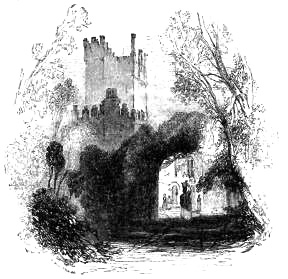Norman Invasion of Ireland
For some time Dermod failed in his efforts to obtain assistance. After some fruitless negotiations with the needy and lawless adventurers who thronged the port of Bristol, he applied to the Earl of Pembroke, Richard de Clare. This nobleman had obtained the name of Strongbow, by which he is more generally known, from his skill in archery. Two other young men of rank joined the party; they were sons of the beautiful and infamous Nesta,[4] once the mistress of Henry I., but now the wife of Gerald, Governor of Pembroke and Lord of Carew. The knights were Maurice FitzGerald and Robert FitzStephen. Dermod had promised them the city of Wexford and two cantreds of land as their reward. Strongbow was to succeed him on the throne of Leinster, and to receive the hand of his young and beautiful daughter, Eva, in marriage.
There is considerable uncertainty as to the real date and the precise circumstances of Dermod's arrival in Ireland. According to one account, he returned at the close of the year 1168, and concealed himself during the winter in a monastery of Augustinian Canons at Ferns, which he had founded. The two principal authorities are Giraldus Cambrensis and Maurice Regan; the latter was Dermod Mac Murrough's secretary. According to his account, Robert FitzStephen landed at Bannow, near Waterford, in May, 1169, with an army of three hundred archers, thirty knights, and sixty men-at-arms.[5] A second detachment arrived the next day, headed by Maurice de Prendergast, a Welsh gentleman, with ten knights and sixty archers. Dermod at once assembled his men, and joined his allies. He could only muster five hundred followers; but with their united forces, such as they were, the outlawed king and the needy adventurers laid siege to the city of Wexford. The brave inhabitants of this mercantile town at once set forth to meet them; but, fearing the result if attacked in open field by well-disciplined troops, they fired the suburbs, and entrenched themselves in the town.

Bargy Castle
Next morning the assaulting party prepared for a renewal of hostilities, but the clergy of Wexford advised an effort for peace: terms of capitulation were negotiated, and Dermod was obliged to pardon, when he would probably have preferred to massacre. It is said that FitzStephen burned his little fleet, to show his followers that they must conquer or die. Two cantreds of land, comprising the present baronies of Forth and Bargy,[6] were bestowed on him: and thus was established the first English colony in Ireland. The Irish princes and chieftains appear to have regarded the whole affair with silent contempt. The Annals say they "set nothing by the Flemings;"[7] practically, they set nothing by any of the invaders. Could they have foreseen, even for one moment, the consequences of their indifference, we cannot doubt but that they would have acted in a very different manner. Roderic, the reigning monarch, was not the man either to foresee danger, or to meet it when foreseen; though we might pardon even a more sharp-sighted and vigilant warrior, for overlooking the possible consequence of the invasion of a few mercenary troops, whose only object appeared to be the reinstatement of a petty king. Probably, the troops and their captains were equally free from suspecting what would be the real result of their proceedings.
Notes
[4] Nesta.—David Powell, in his notes to the Itinerary of Cambria, states that this lady was a daughter of Rufus, Prince of Demetia. She was distinguished for her beauty, and infamous for her gallantries. She had a daughter by Gerald of Windsor, called Augweth, who was mother to Giraldus Cambrensis. This relationship accounts for the absurd eulogiums which he has lavished on the Geraldines. Demetia is the district now called Pembrokeshire, where a colony of Normans established themselves after the Norman Conquest.—See Thierry's Norman Conquest.
[5] Men-at-arms.—Hibernia Expugnata, lib. i. c. 16.
[6] Bargy.—Our illustration gives a view of the remains of this ancient castle. It was formerly the residence of Bagenal Harvey, a Protestant gentleman, who suffered in the rebellion of 1798, for his adherence to the cause of Ireland.
[7] Flemings.—Dr. O'Donovan mentions, in a note to the Four Masters, that he was particularly struck with the difference between the personal appearance of the inhabitants of the baronies where they settled. The Cavanaghs and Murphys are tall and slight; the Flemings and Codds short and stout. They still retain some peculiarities of language.
